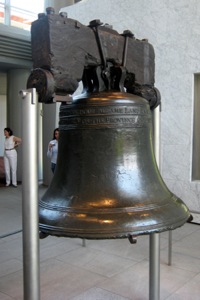 Having spent more than three years doing dissertation research on the changing journalistic ecosystem in Philadelphia, I was excited to see Technically Philly get a great write up last week. And having spent the past six months as a research assistant with the Downie-Schudson report on reconstructing American journalism, I see a connection between Technically Philly, CUNY’s New Business Models For News, and the report. The nub of the connection has to do with building stronger news networks and deciding on the network ties we allow ourselves to utilize when we build them.
Having spent more than three years doing dissertation research on the changing journalistic ecosystem in Philadelphia, I was excited to see Technically Philly get a great write up last week. And having spent the past six months as a research assistant with the Downie-Schudson report on reconstructing American journalism, I see a connection between Technically Philly, CUNY’s New Business Models For News, and the report. The nub of the connection has to do with building stronger news networks and deciding on the network ties we allow ourselves to utilize when we build them.
The ultimate story of my dissertation research — as much as I didn’t want it to be — had to do with the unraveling of a once-dominant Philadelphia news network, Philadelphia Media Holdings (a.k.a. the newspapers — see the latest on their bankruptcy here), and the simultaneous failure to build new local news networks in the city. While we often hear a lot about news-network successes, we don’t here as much about their fragility and the obstacles that lie in the way of building them. (See this tweet by Jay Rosen about the “lifecycle of hyper-local” for another example.)
Watching the emerging news void in Philadelphia, which grew despite many valiant attempts to fill it, was a sobering lesson for me on the promise and limits of the new networked news ecology.
The Technically Philly folks were not part of my original dissertation; they came on the scene too late, though I hope they will play a prominent role in my upcoming book. They seem to have learned the lesson that you need strong ties to build news networks, and that these ties most often come in the form of money, organizational infrastructure, and the creation of institutional routines. As they write in their Knight News Challenge grant application for Newsadelphia:
Newsadelphia is an administrative, sales and marketing hub for a confederation of hyperlocal and otherwise targeted online-only news sites within the city of Philadelphia. By offering a variety of services for Web-based organizations like sales, IT support, event planning and marketing to decentralized editorial products, we will empower these sites to focus on their individualized editorial visions while creating sustainable, profitable media businesses.
And here’s what all this has to do with the Downie-Schudson report and CUNY’s New Business Models For News initiative. I would argue that both “Reconstructing Journalism” and New Business Models For News are ultimately about how to build strong news networks. Neither of them uses precisely that language, but it’s evident to me that smart thinkers have moved beyond the question of “how to save newspapers” and even “how to save news institutions” to the ultimate question of “how do we build durable news networks?” The problems faced in a city like Philadelphia, to my mind, inform the more macro-level work being undertaken by Columbia, CUNY and others.
The disagreement between Jeff Jarvis and Schudson-Downie, then, simply boils down to a question of what resources we allow ourselves to use when tying these networks together. Downie and Schudson have concluded that the state can play a real (but highly limited) role in the facilitation of network ties. Jarvis disagrees; he sees capitalism as ultimately playing the only necessary role in the creation and strengthening of the new networked news ecology. In dismissing the Downie-Schudson idea for a “Fund For Local News,” he writes that this would amount to:
Collective responsibility. Socialized journalism. This is the ultimate in broccoli journalism: You are not only forced to read what journalists say is good for you but you are now forced to pay for it through taxation.
Indeed, he sees state-facilitated network ties as capable of playing only a corrupting influence. While the sinews of capitalism promise strength and freedom, the tendons of state subsidy are degenerate and weak.
As something of a philosophical anarchist who worked for nearly a decade with that ultimate example of DIY networked journalism, Indymedia, I would love to live in a world where the only subsidies necessary for the creation of news were optimism of the will and plenty of free time. Alas, experience has taught me that this is not the case. All network ties — whether they are state-based, market-based, or technology-based — come with strings. But as the French sociologist Bruno Latour has put it, strings can be more than just negative impediments to movement. As in a marionette, strings (and network ties) can also allow increasingly nuanced actions to occur in the world. It would be a shame to dismiss any of them out of hand.
This is why I ultimately feel that Jarvis and Downie are complementary rather than antagonistic. Something resembling Jarvis’ world will emerge in the not-too-distant future, but it will still be a world with holes. Why should we dismiss (very limited) attempts to fill them, outside the marketplace?
I’d be curious to see what the Technically Philly Folks would say: Would they accept money from a “Fund For Local News”? Or would they see it as tainted? On the answer to this question, ultimately, lies the fate of the various proposals in reconstructing American journalism.
Photo by Wally Gobetz used under a Creative Commons license.